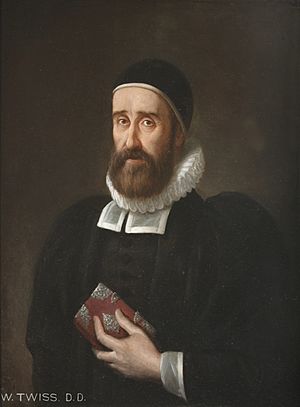William Twisse facts for kids
William Twisse (born 1578 near Newbury, England – died July 20, 1646) was an important English church leader and thinker. He became the main leader, called Prolocutor, of the Westminster Assembly in 1643. This made him the head of the churchmen during the time of the Commonwealth in England. A Scottish member of the Assembly, Robert Baillie, described him as "very good, loved by all, and highly respected; but mostly interested in books."
Contents
Life Story
William Twisse's parents were from Germany. He went to school at Winchester College and then studied at New College, Oxford.
In 1612, King James I of England chose him to be a chaplain for his daughter, Elizabeth of Bohemia. This job did not last long. Around 1613, Twisse returned to England from Heidelberg.
After returning, he became a church leader in Newton Longueville. He also worked with Henry Savile on a new edition of books by Thomas Bradwardine in 1618. From 1620, he was the vicar (a type of priest) in Newbury. In Newbury, he was known for disagreeing with William Laud, another powerful church leader.
William Twisse passed away on July 20, 1646. He was first buried in Westminster Abbey. However, in 1661, his remains were moved. They were placed with many other Parliament supporters in a burial pit at St Margaret's, Westminster churchyard.
His Beliefs
Twisse was a strong supporter of a type of Christian belief called Calvinism. He believed in a strict idea of predestination, which is the idea that God has already decided everything that will happen.
In his book Vindiciae gratiae from 1632, he wrote against the ideas of Jacobus Arminius. Arminius had different views on predestination. In another book, Dissertatio de scientia media (1639), Twisse used some arguments from the Dominican Order to support his views on predestination. However, his specific ideas were not shared by most people at the Westminster Assembly.
Twisse also believed that Jesus would return to Earth before a thousand-year period of peace (this is called premillennialism). He wrote an introduction for the 1643 English translation of Key of the Revelation. This book was written by his friend and fellow thinker, Joseph Mede, and was very important at the time.
His Written Works
William Twisse wrote several books and papers. Here are some of them:
- A Discovery of D. Jackson's Vanity (1631) – written against Thomas Jackson
- Vindiciae Gratiae (Amsterdam, 1632)
- Dissertatio de scientia media tribus libris absoluta (Arnhem 1639)
- The Riches of Gods Love (1653) – written with Henry Jeanes and John Goodwin
- An Examination of Mr. Cotton's Analysis of The Ninth Chapter of Romans
- The Five Points of Grace and of Predestination
- Of the Morality of the Fourth Commandment
- A Treatise of Mr. Cotton's Clearing Certaine Doubts Concerning Predestination
- The Doctrine of the Synod of Dort and Arles, Reduced to the Practice (1650)
- Of the morality of the Fourth Commandment, as still in force to binde Christians : delivered by way of answer to the translator of Doctor Prideaux his lecture, concerning the doctrine of the Sabbath (1641)
See also
- scientia media
 | Chris Smalls |
 | Fred Hampton |
 | Ralph Abernathy |


